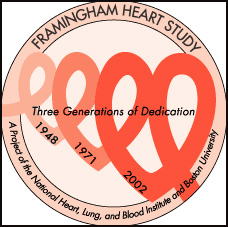History of the Framingham Heart Study Brain Aging Program
 Since its inception in 1948, the Framingham Heart Study (FHS) has been a pioneering force in unraveling the mysteries of cardiovascular disease (CVD) and their impact on public health. As a joint venture of the National Heart, Lung, and Blood Institute (NHLBI) and Boston University, the FHS initially sought to identify the common factors contributing to CVD.
Since its inception in 1948, the Framingham Heart Study (FHS) has been a pioneering force in unraveling the mysteries of cardiovascular disease (CVD) and their impact on public health. As a joint venture of the National Heart, Lung, and Blood Institute (NHLBI) and Boston University, the FHS initially sought to identify the common factors contributing to CVD.
Over the decades, the FHS expanded its scope, recruiting multiple generations from Framingham, Massachusetts. The study’s significance skyrocketed in 1976 as it began tracking participants for incident dementia, delving into the differences between normal aging and pathological alterations associated with diseases like Alzheimer’s (AD) and vascular dementia.
In 2 020, the FHS entered a transformative phase the addition of the Framingham Heart Study Brain Aging Program (FHS-BAP). This program, fueled by a $26.56 million grant from the National Institutes of Health, signifies a new era in the FHS’s commitment to understanding brain aging.
020, the FHS entered a transformative phase the addition of the Framingham Heart Study Brain Aging Program (FHS-BAP). This program, fueled by a $26.56 million grant from the National Institutes of Health, signifies a new era in the FHS’s commitment to understanding brain aging.
Under the leadership of Lindsay Farrer, PhD, chief of biomedical genetics and a principal investigator, the FHS-BAP focuses on dementia surveillance, brain donation, and three interrelated projects. These projects explore vascular and inflammatory contributors to AD, identifying factors associated with AD risk and resilience, investigating the link between AD genetic vulnerabilities and chronic inflammation, and studying the impact of gene variants affecting immune function on AD-related changes.
Rhoda Au, PhD, a principal investigator, plays a crucial role in coordinating research participant engagement, emphasizing interdisciplinary approaches. The FHS-BAP leverages up to 70 years of follow-up data and embraces a multi-generational perspective.
 Dr. Farrer’s groundbreaking research, spanning over 450 publications, has illuminated genetic risk factors for various neurodegenerative diseases. Collaborating globally, his group identified genes and mechanisms behind disorders like AD and hypertension.
Dr. Farrer’s groundbreaking research, spanning over 450 publications, has illuminated genetic risk factors for various neurodegenerative diseases. Collaborating globally, his group identified genes and mechanisms behind disorders like AD and hypertension.
Dr. Au, involved in FHS research since 1990, introduced the Boston Process Approach (BPA) to enhance sensitivity in cognitive testing. The FHS became
 the first to apply the BPA method to epidemiologic research, paving the way for more effective detection of cognitive changes.
the first to apply the BPA method to epidemiologic research, paving the way for more effective detection of cognitive changes.
The FHS-BAP not only marks a significant milestone in dementia research but also underscores a broader emphasis on precision health. Through a pilot projects program and proactive data sharing, the program aims to engage early-stage investigators and expand collaboration beyond the AD field.
As the FHS continues to impact public health by establishing links between various diseases and aging, the FHS-BAP stands as a testament to its ongoing commitment to unraveling the complexities of brain aging and optimizing health outcomes for future generations.
